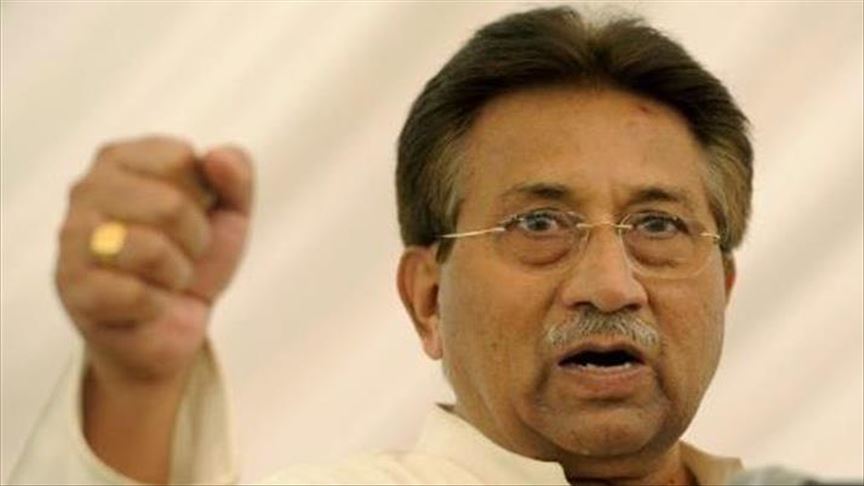PROFILE - Pervez Musharraf: Man of war and peace
Friends describe Musharraf a professional soldier, but also one believing in show of power

ANKARA, Turkey / KARACHI, Pakistan
From leading the Kargil war in 1999, to drafting a peace plan for Kashmir with India in 2006, Pakistan’s former military ruler Gen. Pervez Musharraf has carved a niche in history, as both a man of war and peace.
Known for contradictions, he introduced concept of basic democracy, allowed a rush of news channels dotting Pakistan’s landscape, familiarized transparency in government decisions, but at the same time subverted democracy, held constitution in abeyance and dismissed an elected government.
Those, who have dealt with him, point out that he was both inspirational and exasperating, selfish and selfless also at the same time humble and egotistical.
On Tuesday, he became the second head of state in Pakistan after Zulfiqar Ali Bhutto, who was handed over death sentence by the court.
He was held guilty of high treason, for imposing state of emergency on Nov. 3, 2007, by keeping the constitution in abeyance.
On Oct. 12, 1999, four months after Kargil war ended, Musharraf in a coup ousted and arrested Prime Minister Nawaz Sharif amid high drama. A year earlier, Sharif had personally promoted him to the rank of army chief. He ruled Pakistan till 2008. The eventful period led Pakistan to join the U.S.-led war on terror in Afghanistan.
Believed in solo fights
Friends describe Musharraf a professional soldier, but also a person who believed in show of power.
Musharraf was born on Aug. 11, 1943 in Indian capital New Delhi. Musharraf family moved to Pakistan’s southern city of Karachi after the birth of Pakistan in 1947. His father, Syed Musharrafuddin, was an accounts officer.
After ousting Sharif from power, he disguised as “chief executive” until 2002, till he forced then President Rafiq Tarar to resign and declared himself president. He continued to hold this post till he was removed in 2008.
Retired brigadier of Pakistan Army Said Nazir told Anadolu Agency that Musharraf was the “main architect” of Kargil war between Pakistan and India in 1999. The war took place months after then Prime Minister Sharif had signed a peace accord with his Indian counterpart Atal Bihari Vajpayee in Lahore.
“Musharraf was a commando who believed more in physical power than use of brain,” Nazir said.
Musharraf was in Sri Lanka on an official tour when Prime Minister Sharif decided to replace him with Gen. Ziauddin, the then chief of Pakistan's spy agency -- ISI. The plane carrying Musharraf was not allowed to land at the Karachi airport in Pakistan by Sharif, which forced the army to react. “This step by Sharif invited reaction from within the army,” a former Pakistan army general, who has served at many important positions told Anadolu Agency.
Charges against Musharraf
Four charges were brought against him in 2013 including one that of treason under article 6 of Pakistan constitution. The case relates to “state of emergency”, suspending Pakistan constitution and detaining senior political leaders and judges. He was named in murder of Akbar Bugti, former chief minister of Balochistan. He was also named in the murder of former Prime Minister Benazir Bhutto.
Ultimately, he was charged of confining judges, arresting and threatening besides illegally suspending the constitution. A special court tried Musharraf for six years. However, the former army chief appeared before the court only a couple of times.
Although he is on the run in Dubai, where he is battling multiple disease including cardiac, the decision of the special court to hang him can be challenged in higher courts of Pakistan.
Brigadier Nazir said that Musharraf’s decision to join the U.S. war on terror proved a monumental mistake.
''Pakistan suffered massively. Besides, it was wrong to send in army to FATA [now part of Khyber Pakhtunkhwa province]. It generated hate and people disliked it,'' he said.
Many people, however, believe that Musharraf brought slew of reforms in Pakistani system. He is also credited for increasing role of women in parliament and somehow stabilizing the economy.
Turkish touch
Musharraf could speak Turkish language fluently, as he had learnt it while studying a war course at Turkey's Military Staff College.
In 2005, when a massive earthquake hit northern parts of Pakistan resulting in death of thousands of civilians, Turkish people were first to extend help. Turkish humanitarian aid organizations were already in the region which witnessed the major casualties.
Musharraf is reported to have expressed his "surprise" over such an instant response of Turkish people to the disaster due to the earthquake. "Even before I mobilized my government, Turks were already on ground helping people," the former military ruler is reported to have confessed to then Turkish government.
"He was liberal by dispositions and encouraged enlightened moderation," Nazir remarked.
Anadolu Agency website contains only a portion of the news stories offered to subscribers in the AA News Broadcasting System (HAS), and in summarized form. Please contact us for subscription options.







